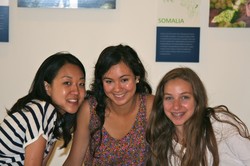
Aram Bae, Beatrice Terino, and Gaby Verdolini at the UN as part of the Youth Making a Difference Seminar
Thanks to Beatrice Terino for sharing this reflection:
I attended the UN trip as a member of the Brick Presbyterian Church. I had been told that I would meet with people from Israel who were visiting New York as a part of a program with Givat Haviva. The program was actually a photography class made up of youth from Israel – both Jews and Arabs. I had heard about the conflict between these peoples, but I did not know much about the issue.
This trip educated me on the conflict between Jews and Arabs. From one girl, I learned that the conflict was based on land and the differences between the two cultures. The same girl asked me why the United States didn’t have segregation and fights between different races and cultures. It was not until then that I realized how we lived in completely different societies. She found it surprising how the different races in my country could live among each other without creating a war, and I found it surprising that two peoples could become so segregated based on their religious and cultural disagreements. It was surprising for me to learn how kids who appeared and behaved just like I did could view the world in a different way. I explained to her how the people of the U.S weren’t always tolerant of other races and cultures in our history. I also explained how I had never experienced a time in my life now when a large number of people were intolerant, since many Americans accepted people with different beliefs than their own. The U.S is not a racism-free country now, but our government would never allow the few racist people in the country to put into action their intolerance of other peoples. This girl found this hard to imagine since in Israel, intolerance for the other nation could be expressed freely. How could I explain to this girl how our country managed to have such a secure tolerance policy now, while her country was segregated based on intolerance?
It is understood, at least in my school, that even if you may not agree with someone’s beliefs that you should still accept the person and it should not come in between your friendship. I am Christian while my best friend is Muslim but I still feel like I accept her just as much as I would if we shared the same religious beliefs. I was glad to see that the kids in this program could share the same kind of friendship despite the influence of their country’s segregation. What was most impressive to me about the kids who participated in this program was that they decided to join it on their own terms knowing that they would be communicating with their “enemy.” They were open to listening to each other’s different point of views, while knowing that the people they live among may not be open to the same opportunity. One boy said that discussions could be very frustrating because of their different views, but they also learned that they were similar in many ways as well. These kids had the spirit in them to be open to others.
This was a great learning experience for me, because it taught me about differences in society in other parts of the world. This trip expanded my knowledge of government and culture from outside of my country to the large world I share with other nations.
Beatrice A. Terino, Member, Brick Presbyterian Church